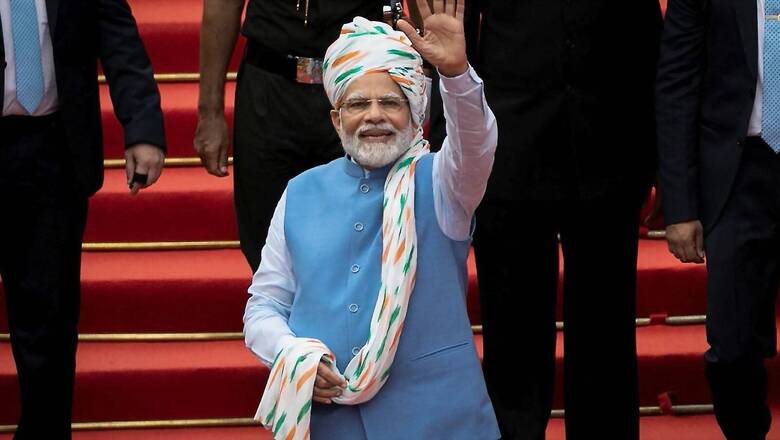
views
The stage is all set for the first in-person summit of the Shanghai Cooperation Organisation (SCO) in Uzbekistan’s Samarkand on Thursday after two years, shaking off the Covid-19 fears and providing a rare opportunity for all its eight heads of state to meet on the sidelines of the event to have face-to-face talks on pressing global and regional issues of common concern.
The last in-person SCO summit was held in Bishkek, Kyrgyzstan, in 2019. The 2020 Moscow summit was held virtually due to the pandemic, while the 2021 summit at Dushanbe was conducted in a hybrid mode.
This is the first time after the 2020 Covid-19 pandemic that Prime Minister Narendra Modi, his Pakistani counterpart Shehbaz Sharif along with Chinese President Xi Jinping and his Russian counterpart Vladimir Putin will be attending the two-day summit. The sudden announcement of Xi’s participation in the SCO summit, shedding his Covid-19 concerns has created a buzz.
News18 brings to you a lowdown on SCO and what the summit means for India:
First, what is SCO?
The decision to create the Shanghai Cooperation Organisation (SCO) was taken on June 15, 2001, by the Republic of Kazakhstan, the People’s Republic of China, the Kyrgyz Republic, the Russian Federation, the Republic of Tajikistan and the Republic of Uzbekistan.
Initially, the SCO focused on mutual intraregional efforts to curb terrorism, separatism and extremism in Central Asia. The Charter of the Shanghai Cooperation Organisation was signed at the St.Petersburg Summit of the Heads of State of the SCO in June 2002 and entered into force on 19 September 2003.
Currently, eight countries enjoy the status of the SCO full members: India, Kazakhstan, China, Kyrgyzstan, Russia, Pakistan, Tajikistan and Uzbekistan; four countries — Afghanistan, Belarus, Iran and Mongolia — have an observer status with the SCO, and six countries — Azerbaijan, Armenia, Cambodia, Nepal, Turkey and Sri Lanka — have a dialogue partner status.
How does SCO work?
The Heads of State Council (HSC) is the highest decision-making body in the SCO. It meets once every year to take decisions and give instructions on all important issues regarding SCO activity.
The Heads of Government Council (HGC) meets once per year to discuss a strategy for multilateral cooperation and priority directions within the Organisation’s framework, to solve important and pressing cooperation issues in economic and other areas, as well as to adopt the Organisation’s annual budget.
PM Modi at SCO
The External Affairs Ministry has said the prime minister is likely to hold a “few bilateral meetings" on the margins of the summit but didn’t give details.
Russian Presidential aide Yuri Ushakov told reporters that President Vladimir Putin will discuss Russian-Indian cooperation within the UN and G20 with Prime Minister Modi during the SCO meeting.
“A conversation on international agenda with Modi will also take place, the sides will discuss issues of strategic stability, the situation in the Asia Pacific Region, and, of course, cooperation within major multilateral formats, such as the UN, the G20 and the SCO," Ushakov said, Russian news agency TASS reported.
The china factor
On Wednesday, Xi Jinping for the first time in over two years flew out of China, news agency PTI reported. He travelled to Kazakhstan on his first state visit since January 2020 from there he would travel to neighbouring Uzbekistan to take part in the Samarkand summit. China kept his programme under wraps and declined to confirm reports of Xi’s meetings with Putin and Modi on the sidelines.
The visit comes amid the sudden move by China last week to accede to India’s demand to pull back its troops from the contentious Petrol Point 15 at Gogra and Hot Springs, which some say is a step forward to end the military standoff in eastern Ladakh that began in May 2020 after which the relations between the two countries nosedived. As a result of a series of military and diplomatic talks, the two sides completed the disengagement process last year on the north and south banks of Pangong Lake and in the Gogra area.
The pullback of troops from PP-15 has sparked speculation about the likelihood of a Modi-Xi meeting at Samarkand. The Samarkand SCO summit will also mark the second recent expansion of the organisation as Iran will be formally admitted into the influential Central Asian grouping after India and Pakistan’s admission as full members in 2017.
Modi and Jinping met 18 times in the last nine years after PM Modi came to power in 2014. In the last nine years, Jinping visited India thrice, while PM Modi visited China five times.
The Pakistan angle
Pakistan Prime Minister Muhammad Shehbaz Sharif has no plans to meet his Indian counterpart on the sidelines of the SCO summit. “No meeting is envisaged with the Indian Prime Minister," Foreign Office spokesman Asim Iftikhar told Dawn News.
An official said though a brief courtesy meeting between the two was possible, they would not be holding talks saying none of the two sides have sought a meeting.
Significance for Eurasia
The relevance of Uzbekistan has further increased in recent years as it is one of the three Central Asian countries that share borders with Afghanistan, which has emerged as a huge security threat to India and the region because of the large number of terrorist groups that have been provided a safe haven there by the Taliban.
For Putin, the summit comes as an opportunity to shore up his influence in Central Asia which has been on the decline since the Ukraine conflict started. It will also be an opportunity for both Putin and Xi to appear physically together to reassert their “no limits" partnership as announced on February 4 at the Winter Olympics in Beijing. This would be important as their conflict with the US and the West is out in the open much more than it has ever been in the recent past.
The importance of Uzbekistan has also increased for the BRI because of the projected launch of the much delayed China-Kyrgyzstan-Uzbekistan railway link next year, as also the Termez-Kabul-Peshawar rail line to connect with the China-Pakistan-Economic Corridor (CPEC).
Read all the Latest Explainers News and Breaking News here



















Comments
0 comment